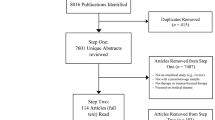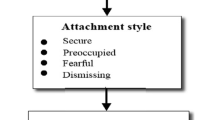Abstract
Fifty-six mothers of premature infants who participated in a study to reduce symptoms of posttraumatic stress disorder (PTSD) completed the Brief COPE, a self-report inventory of coping mechanisms, the Stanford Acute Stress Reaction Questionnaire to assess acute stress disorder (ASD) and the Davidson Trauma Scale to assess PTSD. 18 % of mothers had baseline ASD while 30 % of mothers met the criteria for PTSD at the 1-month follow-up. Dysfunctional coping as measured by the Brief COPE was positively associated with elevated risk of PTSD in these mothers (RR = 1.09, 95 % CI 1.02–1.15; p = .008). Maternal education was positively associated with PTSD; each year increase in education was associated with a 17 % increase in the relative risk of PTSD at 1 month follow-up (RR = 1.17, 95 % CI 1.02–1.35; p = .03). Results suggest that dysfunctional coping is an important issue to consider in the development of PTSD in parents of premature infants.
Similar content being viewed by others
References
Amoyal, N. R., Mason, S. T., Gould, N. F., Corry, N., Mahfouz, S., Barkey, A., et al. (2011). Measuring coping behavior in patients with major burn injuries: A psychometric evaluation of the BCOPE. Journal of Burn Care Research, 32, 392–398.
Balluffi, A., Kassam-Adams, N., Kazak, A., Tucker, M., Dominguez, T., & Helfaer, M. (2004). Traumatic stress in parents of children admitted to the pediatric intensive care unit. Pediatric Critical Care Medicine, 5, 547–553.
Baskin, C. H., Forehand, R., & Saylor, C. (1985). Predictors of psychological adjustment in mothers of children with cancer. Journal of Psychosocial Oncology, 3, 43–54.
Beck, A. T., Steer, R. A., & Brown, G. K. (1996). Beck Depression Inventory (2nd ed.). San Antonio, TX: The Psychological Corporation, Harcourt Brace & Company.
Bernard, R. S., Williams, S. E., Storfer-Isser, A., Rhine, W., Horwitz, S. M., Koopman, C., et al. (2011). Brief cognitive-behavioral intervention for maternal depression and trauma in the neonatal intensive care unit: A pilot study. Journal of Traumatic Stress, 24, 230–234.
Bisson, J., & Andrew, M. (2007). Psychological treatment of post-traumatic stress disorder (PTSD). Cochrane Database of Systemic Reviews, 3, CD003388.
Brewin, C. R., Andrews, B., & Valentine, J. D. (2000). Meta-analysis of risk factors for posttraumatic stress disorder in trauma-exposed adults. Journal of Consulting and Clinical Psychology, 68, 748–766.
Bronner, M. B., Kayser, A. M., Knoester, H., Bos, A. P., Last, B. F., & Grootenhuis, M. A. (2009). A pilot study on peritraumatic dissociation and coping styles as risk factors for posttraumatic stress, anxiety and depression in parents after their child’s unexpected admission to a pediatric intensive care unit. Child and Adolescent Psychiatry and Mental Health, 3, 33.
Bryant, R. A. (2011). Acute stress disorder as a predictor of posttraumatic stress disorder: A systematic review. Journal of Clinical Psychiatry, 72, 233–239.
Carver, C. S. (1997). You want to measure coping but your protocol’s too long: Consider the Brief COPE. International Journal of Behavioral Medicine, 4, 92–100.
Carver, C. S., Scheier, M. F., & Weintraub, J. K. (1989). Assessing coping strategies: A theoretically based approach. Journal of Personality and Social Psychology, 56, 267–283.
Classen, C., Koopman, C., Hales, R., & Spiegel, D. (1998). Acute stress disorder as a predictor of posttraumatic stress symptoms. American Journal of Psychiatry, 155, 620–624.
Colville, G. A., & Gracey, D. (2006). Mothers’ recollections of the pediatric intensive care unit: Associations with psychopathology and views on follow up. Intensive and Critical Care Nursing, 22, 49–55.
Cooper, C., Katona, C., & Livingston, G. (2008). Validity and reliability of the brief COPE in carers of people with dementia: The LASER-AD study. Journal of Nervous and Mental Disease, 196, 838–843.
Dasch, K. B., Russell, H. F., Kelly, E. H., Gorzkowski, J. A., Mulcahey, M. J., Betz, R.R., et al. (2011). Coping in caregivers of youth with spinal cord injury. Journal of Clinical Psychology in Medical Settings, 18(4), 361–371.
Davidson, J. R., Book, S. W., Colket, J. T., Tupler, L. A., Roth, S., David, D., et al. (1997). Assessment of a new self-rating scale for posttraumatic stress disorder. Psychological Medicine, 27, 153–160.
Davis, L., Edwards, H., Mohay, H., & Wollin, J. (2003). The impact of very premature birth on the psychological health of mothers. Early Human Development, 73, 61–70.
Feldman Reichman, S. R., Miller, A. C., Gordon, R. M., & Hendricks-Munoz, K. D. (2000). Stress appraisal and coping in mothers of NICU infants. Children’s Health Care, 29, 279–293.
Felton, B. J., & Revenson, T. A. (1984). Coping with chronic illness: A study of illness controllability and the influence of coping strategies on psychological adjustment. Journal of Consulting and Clinical Psychology, 52, 343–353.
Foa, E. B., Hearst-Iked, D., & Perry, K. J. (1995). Evaluation of a brief cognitive-behavioral program for the prevention of chronic PTSD in recent assault victims. Journal of Consulting and Clinical Psychology, 63, 948–955.
Folkman, S., & Lazarus, R. S. (1988). Manual for the Ways of Coping Questionnaire. Research edition. Palo Alto, CA: Consulting Psychologists Press.
Greening, L., & Stoppelbein, L. (2007). Brief report: Pediatric cancer, parental coping style, and risk for depressive, posttraumatic stress, and anxiety symptoms. Journal of Pediatric Psychology, 32, 1272–1277.
Grootenhuis, M. A., & Last, B. F. (1997). Adjustment and coping by parents of children with cancer: A review of the literature. Supportive Care in Cancer, 5, 466–484.
Holditch-Davis, D., Bartlett, T. R., Blickman, A. L., & Miles, M. S. (2003). Posttraumatic stress symptoms in mothers of premature infants. Journal of Obstetric, Gynecological and Neonatal Nursing, 32, 161–171.
Jones, L., Rowe, J., & Becker, T. (2009). Appraisal, coping, and social support as predictors of psychological distress and parenting efficacy in parents of premature infants. Children’s Health Care., 38, 245–262.
Kazak, A., Stuber, M. L., Barakat, L. P., Meeske, K., Guthrie, D., & Meadows, A. T. (2004). Predicting posttraumatic stress symptoms in mothers and fathers of survivors of childhood cancers. Journal of the American Academy of Child and Adolescent Psychiatry, 37, 823–831.
Kersting, A., Dorsch, M., Wesselmann, U., Lüdorff, K., Witthaut, J., Ohrmann, P., et al. (2004). Maternal posttraumatic stress response after the birth of a very low-birth-weight infant. Journal of Psychosomatic Research, 57, 473–476.
Koopman, C., Classen, C., & Spiegel, D. (1994). Predictors of posttraumatic stress symptoms among survivors of the Oakland/Berkeley, California firestorm. American Journal of Psychiatry, 151, 888–894.
Lefkowitz, D. S., Baxt, C., & Evans, J. R. (2010). Prevalence and correlates of posttraumatic stress and postpartum depression in parents of infants in the Neonatal Intensive Care Unit (NICU). Journal of Clinical Psychology in Medical Settings, 17, 230–237.
Liu, M., Lambert, C. E., & Lambert, V. A. (2007). Caregiver burden and coping patterns of Chinese parents of a child with mental illness. International Journal of Mental Health Nursing, 16, 86–95.
Manne, S., DuHamel, K., Stroll, J., Parsons, S., Martini, R., Williams, S. E., et al. (2003). Coping and the course of mother’s depressive symptoms during and after pediatric bone marrow transplantation. Journal of the American Academy of Child and Adolescent Psychiatry, 42, 1055–1068.
Needle, J. S., O’Riordan, M., & Smith, P. G. (2009). Parental anxiety and medical comprehension within 24 hrs of a child’s admission to the pediatric intensive care unit. Pediatric and Critical Care Medicine, 10, 668–674.
Olde, E., van der Hart, O., Kleber, R., & van Son, M. (2006). Posttraumatic stress following childbirth: A review. Clinical Psychology Review, 26, 1–16.
Olley, B. O., Zeier, M. D., Seedat, S., & Stein, D. J. (2005). Post-traumatic stress disorder among recently diagnosed patients with HIV/AIDS in South Africa. AIDS Care, 17, 550–557.
Ozer, E. J., Best, S. R., Lipsey, T. L., & Weiss, D. S. (2003). Predictors of posttraumatic stress disorder and symptoms in adults: A meta-analysis. Psychological Bulletin, 129, 52–73.
Pierrehumbert, B., Nicole, A., Muller-Nix, C., Forcada-Guex, M., & Ansermet, F. (2003). Parental post-traumatic reactions after premature birth: Implications for sleeping and eating problems in the infant. Archives of Disease in Childhood—Fetal and Neonatal Edition, 88, F400–F404.
Pinelli, J. (2000). Effects of family coping and resources on family adjustment and parental stress in the acute phase of the NICU experience. Neonatal Network, 19, 27–37.
Rees, G., Gledhill, J., Garralda, M. E., & Nadel, S. (2004). Psychiatric outcome following pediatric intensive care unit (PICU) admission: A cohort study. Intensive Care Medicine, 30, 1607–1614.
Shaw, R. J., Bernard, R., DeBlois, T., Ikuta, L., Ginzburg, K., & Koopman, C. (2009). The relationship between acute stress disorder and posttraumatic stress disorder in the neonatal intensive care nursery. Psychosomatics, 50, 131–137.
Shaw, R. J., DeBlois, T., Ikuta, L., Ginzburg, K., Fleisher, B., & Koopman, C. (2006). Acute stress disorder among parents of infants in the neonatal intensive care nursery. Psychosomatics, 47, 206–212.
Snell, D. L., Siegert, R. J., Hay-Smith, E. J., & Surgenor, L. J. (2011). Factor structure of the Brief COPE in people with mild traumatic brain injury. Journal of Head Trauma Rehabilitation. Jan 17 2011. [Epub ahead of print].
Spiegelman, D., & Hertzmark, E. (2005). Easy SAS calculations for risk or prevalence ratios and differences. American Journal of Epidemiology, 162, 199–200.
Spielberger, C. (1983). Manual for the State-Trait Anxiety Inventory. Palo Alto, CA: Consulting Psychologists Press.
Tedstone, J. E., & Tarrier, N. (2003). Posttraumatic stress disorder following medical illness and treatment. Clinical Psychology Review, 23, 409–448.
Watson, C. G., Davenport, E., Anderson, P. E., Mendez, C. M., & Gearhart, L. P. (1998). The relationships between premilitary school record data and risk for posttraumatic stress disorder among Vietnam war veterans. Journal of Nervous and Mental Disease, 186, 338–344.
Young Seideman, R., Watson, M. A., Corff, K. E., Odle, P., Haase, J., & Bowerman, J. L. (1997). Parent stress and coping in NICU and PICU. Journal of Pediatric Nursing, 12, 169–177.
Zohar, J., Fostick, L., Cohen, A., Bleichm, A., Dolfin, D., Weissman, Z., et al. (2009). Risk factors for the development of posttraumatic stress disorder following combat trauma: A semiprospective study. Journal of Clinical Psychiatry, 70, 1629–1635.
Acknowledgments
This project was supported by funding from NIH M01 RR00070 for General Clinical Research Center Program, Stanford University School of Medicine and RO1-MH086579A to Drs. Shaw and Horwitz.
Author information
Authors and Affiliations
Corresponding author
Rights and permissions
About this article
Cite this article
Shaw, R.J., Bernard, R.S., Storfer-Isser, A. et al. Parental Coping in the Neonatal Intensive Care Unit. J Clin Psychol Med Settings 20, 135–142 (2013). https://doi.org/10.1007/s10880-012-9328-x
Published:
Issue Date:
DOI: https://doi.org/10.1007/s10880-012-9328-x




